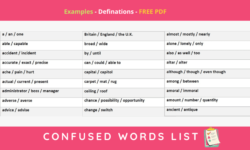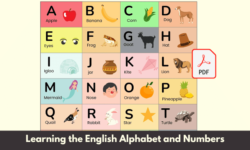Mastering the 12 English Tenses: Your Quick Guide (PDF)
Understanding 12 English tenses can feel overwhelming, but it doesn’t have to be. They are very enjoyable and easy to learn if you follow the right instructions! 🙂 Think of tenses as the tools we use to place our thoughts in time—past, present, or future. In this guide, we’ll simplify the 12 tenses, so you can confidently navigate English grammar.
The 12 English Tenses
What are the 12 different English tenses? The three main verb tenses are past, present, and future, and there are also four grammatical aspects: simple, continuous, perfect, and perfect continuous.
- Simple Present
- Present Continuous
- Simple Past
- Past Continuous
- Simple Future
- Future Continuous
- Present Perfect
- Present Perfect Continuous
- Past Perfect
- Past Perfect Continuous
- Future Perfect
- Future Perfect Continuous
Table of 12 English Tenses

Simple Tenses
Simple Present
- Affirmative: She walks to school.
- Negative: She does not walk to school.
- Question: Does she walk to school?
Use: Regular actions, facts, schedules.
Signal Words: Always, usually, never, often.
Simple Past
- Affirmative: She walked to school.
- Negative: She did not walk to school.
- Question: Did she walk to school?
Use: Actions completed in the past.
Signal Words: Yesterday, last week, in 2010.
Simple Future
- Affirmative: She will walk to school.
- Negative: She will not walk to school.
- Question: Will she walk to school?
Use: Actions that will happen in the future.
Signal Words: Tomorrow, next year, soon.
Continuous Tenses
Present Continuous
- Affirmative: She is walking to school.
- Negative: She is not walking to school.
- Question: Is she walking to school?
Use: Actions happening now, or temporary situations.
Signal Words: Now, currently, at the moment.
Past Continuous
- Affirmative: She was walking to school.
- Negative: She was not walking to school.
- Question: Was she walking to school?
Use: Actions that were in progress at a specific time in the past.
Signal Words: While, when, as long as.
Future Continuous
- Affirmative: She will be walking to school.
- Negative: She will not be walking to school.
- Question: Will she be walking to school?
Use: Actions that will be ongoing at a specific time in the future.
Signal Words: At this time tomorrow, next week, in the future.
Perfect Tenses
Present Perfect
- Affirmative: She has walked to school.
- Negative: She has not walked to school.
- Question: Has she walked to school?
Use: Actions completed at some point before now, with relevance to the present.
Signal Words: Already, just, yet, so far.
Past Perfect
- Affirmative: She had walked to school.
- Negative: She had not walked to school.
- Question: Had she walked to school?
Use: Actions completed before another action in the past.
Signal Words: Before, after, until that moment.
Future Perfect
- Affirmative: She will have walked to school.
- Negative: She will not have walked to school.
- Question: Will she have walked to school?
Use: Actions that will be completed by a certain future time.
Signal Words: By tomorrow, in a week, by then.
Perfect Continuous Tenses
Present Perfect Continuous
- Affirmative: She has been walking to school.
- Negative: She has not been walking to school.
- Question: Has she been walking to school?
Use: Emphasizes the duration of an action that started in the past and continues into the present.
Signal Words: For hours, since last week, all day.
Past Perfect Continuous
- Affirmative: She had been walking to school.
- Negative: She had not been walking to school.
- Question: Had she been walking to school?
Use: Actions that were ongoing in the past up until another past action.
Signal Words: For hours, since last year, all day long.
Future Perfect Continuous
- Affirmative: She will have been walking to school.
- Negative: She will not have been walking to school.
- Question: Will she have been walking to school?
Use: Actions that will continue up to a specific point in the future.
Signal Words: For hours, since morning, by the time.
English Tenses Formula
12 English Tenses Formula PDF – download ⇓
FAQs About English Tenses
- What are the 12 English tenses?
- The 12 English tenses are Simple Present, Present Continuous, Simple Past, Past Continuous, Simple Future, Future Continuous, Present Perfect, Present Perfect Continuous, Past Perfect, Past Perfect Continuous, Future Perfect, and Future Perfect Continuous.
- Why are English tenses important?
- English tenses are important because they help us express actions and events in time, making communication clearer and more precise.
- How can I learn the 12 English tenses effectively?
- You can learn the 12 English tenses effectively by grouping them into past, present, and future categories, practicing each tense with examples, and using them in daily conversations.
- What is the difference between simple and continuous tenses?
- Simple tenses describe general actions or facts, while continuous tenses focus on actions that are ongoing or in progress.
- Which tenses are most commonly used in English?
- The most commonly used tenses in English are the Simple Present, Simple Past, and Present Continuous.
- What is the best way to remember English tenses?
- The best way to remember English tenses is to practice regularly, use them in sentences, and understand the key differences between each tense.



